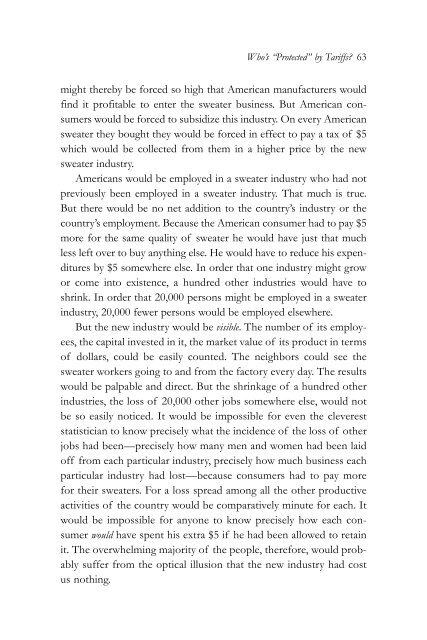1gDdM7w
1gDdM7w
1gDdM7w
- No tags were found...
Create successful ePaper yourself
Turn your PDF publications into a flip-book with our unique Google optimized e-Paper software.
Who’s “Protected” by Tariffs? 63might thereby be forced so high that American manufacturers wouldfind it profitable to enter the sweater business. But American consumerswould be forced to subsidize this industry. On every Americansweater they bought they would be forced in effect to pay a tax of $5which would be collected from them in a higher price by the newsweater industry.Americans would be employed in a sweater industry who had notpreviously been employed in a sweater industry. That much is true.But there would be no net addition to the country’s industry or thecountry’s employment. Because the American consumer had to pay $5more for the same quality of sweater he would have just that muchless left over to buy anything else. He would have to reduce his expendituresby $5 somewhere else. In order that one industry might growor come into existence, a hundred other industries would have toshrink. In order that 20,000 persons might be employed in a sweaterindustry, 20,000 fewer persons would be employed elsewhere.But the new industry would be visible. The number of its employees,the capital invested in it, the market value of its product in termsof dollars, could be easily counted. The neighbors could see thesweater workers going to and from the factory every day. The resultswould be palpable and direct. But the shrinkage of a hundred otherindustries, the loss of 20,000 other jobs somewhere else, would notbe so easily noticed. It would be impossible for even the clevereststatistician to know precisely what the incidence of the loss of otherjobs had been—precisely how many men and women had been laidoff from each particular industry, precisely how much business eachparticular industry had lost—because consumers had to pay morefor their sweaters. For a loss spread among all the other productiveactivities of the country would be comparatively minute for each. Itwould be impossible for anyone to know precisely how each consumerwould have spent his extra $5 if he had been allowed to retainit. The overwhelming majority of the people, therefore, would probablysuffer from the optical illusion that the new industry had costus nothing.


